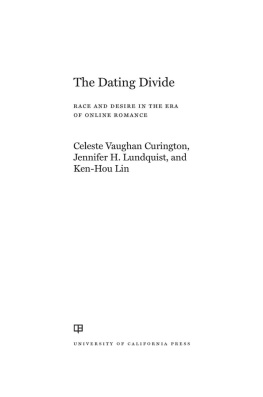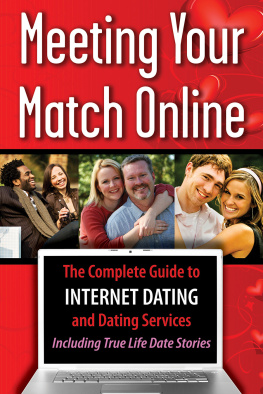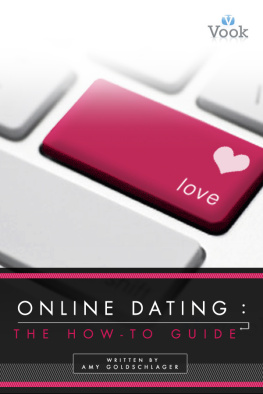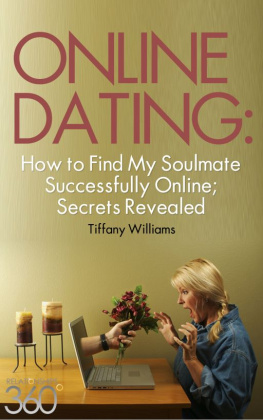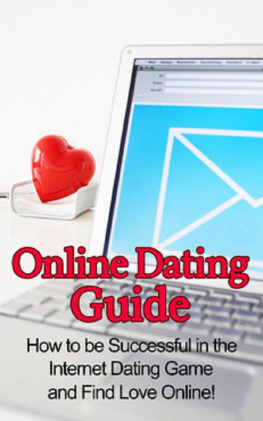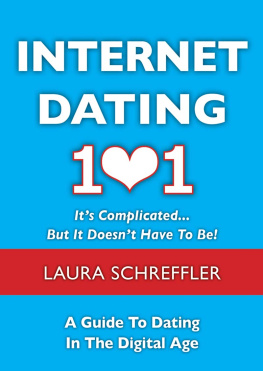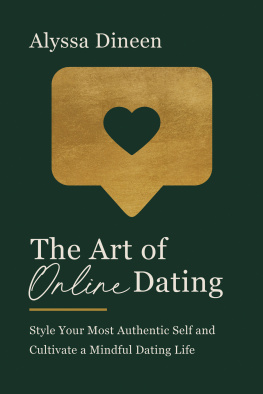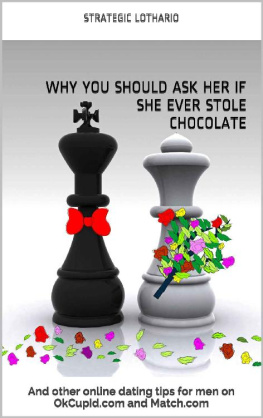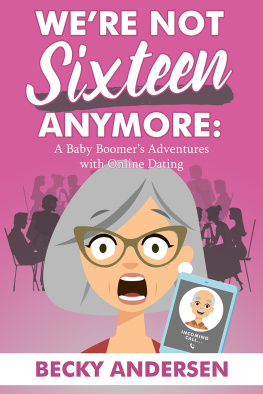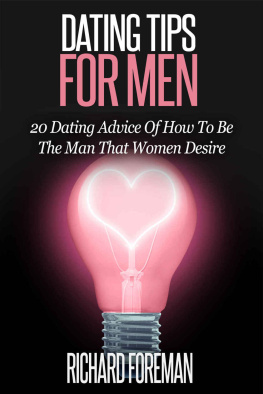The Dating Divide
Praise for The Dating Divide
The authors analyze the data that have been hiding in plain sight to show how the search for love and intimacy is racialized. This asks us to ask ourselves, Is the taste for a homogeneous racial match in itself racist?
Pepper Schwartz, Professor of Sociology, University of Washington
Does your race affect whether you get messages on a dating site? Using data from a major dating site, the authors of The Dating Divide reveal the sad truth that whether youre white, black, Asian, or Latino/a trumps almost everything else. But the effect of race depends on whether youre a man or woman and whether youre gay or straight. This is the definitive intersectional analysis.
Paula England, Professor of Sociology, New York University
Online dating offered the potential to dismantle racial boundaries by democratizing courtship. Not only has it failed to deliver, but it has created a unique form of digital-sexual racism marked by white privilege, anti-Blackness, and gendered tropes. These categorical preferences and biases are reconstructed through and within online dating sites under the veil of individual preferences. Based on analyses of millions of dating profiles and in-depth interviews, the authors masterfully show that despite the increasing racial and ethnic diversity of dating pools, dating apartheid remains in place.
Jennifer Lee, Professor of Sociology, Columbia University
Online dating opens doors for people to meet across racial groups. This groundbreaking study nevertheless uncovers a manifestation of digital-sexual racism in American intimate life, based on data from millions of users on a dating website, along with in-depth interviews of seventy-seven online daters. For understanding race in America, this thought-provoking book is a must-read.
Zhenchao Qian, Professor of Sociology, Brown University
The Dating Divide
RACE AND DESIRE IN THE ERA OF ONLINE ROMANCE
Celeste Vaughan Curington, Jennifer H. Lundquist, and Ken-Hou Lin

UNIVERSITY OF CALIFORNIA PRESS
University of California Press
Oakland, California
2021 by Celeste Vaughan Curington, Jennifer H. Lundquist, and Ken-Hou Lin
Library of Congress Cataloging-in-Publication Data
Names: Curington, Celeste Vaughan, 1988 author. | Lundquist, Jennifer H., author. | Lin, Ken-Hou, author.
Title: The dating divide : race and desire in the era of online romance / Celeste Vaughan Curington, Jennifer H. Lundquist, and Ken-Hou Lin.
Description: Oakland, California : University of California Press, [2021] | Includes bibliographical references and index.
Identifiers: LCCN 2020033282 (print) | LCCN 2020033283 (ebook) | ISBN 9780520293441 (hardback) | ISBN 9780520293458 (paperback) | ISBN 9780520966703 (ebook)
Subjects: LCSH : Online dating. | Racism.
Classification: LCC HQ 801.82 . C 87 2021 (print) | LCC HQ 801.82 (ebook) | DDC 306.730285dc23
LC record available at https://lccn.loc.gov/2020033282
LC ebook record available at https://lccn.loc.gov/2020033283
Manufactured in the United States of America
29 28 27 26 25 24 23 22 21
10 9 8 7 6 5 4 3 2 1
Contents
Tables and Figures
TABLES
A.1 .
A.2 .
FIGURES
I.1 .
I.2 .
I.3 .
3.1 .
4.1 .
4.2 .
4.3 .
4.4 .
4.5 .
4.6 .
4.7 .
4.8 .
4.9 .
4.10 .
4.11 .
4.12 .
4.13 .
5.1 .
5.2 .
5.3 .
5.4 .
5.5 .
5.6 .
5.7 .
6.1 .
6.2 .
6.3 .
6.4 .
7.1 .
7.2 .
7.3 .
7.4 .
7.5 .
8.1 .
8.2 .
8.3 .
8.4 .
Introduction
DEAR TINDER, GUESS WHOS COMING TO DINNER
Quotidian racism in the American tradition might be dependent upon economic and political relations, but it escapes our notice when such relations turn their attention to the procreative possibilities of our erotic lives.
Sharon Holland, 2014
In the 1967 movie Guess Whos Coming to Dinner, a White woman brings home her Black fianc to meet her unsuspecting but liberal-minded parents. Released just fifty years after the Ku Klux Klanidealizing film Birth of a Nation and just six months after antimiscegenation laws were struck down by the Supreme Court decision in Loving v. Virginia, the movie was as radically provocative as it was acclaimed. Fast forward fifty years, and we must ask, Is the topic of interracial dating noteworthy anymore?
At least in popular culture, interracial relationships feature across a multitude of celebrity romances, from Serena Williams and Alexis Ohanian to Prince Harry and Meghan Markle, and they are no longer rare in popular television shows and films. A remake of Guess Whos Coming to Dinner was released more recently, to little notice or acclaim (note to Hollywood producers: when Sidney Poitiers character is played by Ashton Kutcher, you know youve lost some political edge). Yet, beyond Hollywood, interracial unions remain rare in the United States. When they do occur, they are far from universally accepted, often evoking deeply fissured debates around gender, race, and sexuality. We decided to write this book because we wanted to understand why.
To social scientists the internetand the social commentary it fosterscan open a window into what people are really thinking. Amid easy (if incomplete) anonymity and low consequences, people often reveal their innermost, atavistic thoughts and beliefs, especially in moments when they are emotionally charged or under the influence of substances. Thus, the internet provides a powerful lens through which we might see how ordinary people think about sensitive issues such as race, gender, and sex. Their commentaries and comments show us how many people are still scandalized by interracial relations.
Among recent controversies we can point to a 2013 Cheerios commercial in which General Mills featured what appeared to be an interracial family enjoying their breakfast cereal. It was removed from YouTube because so many viewers were enraged by the depictionand so many racial slurs punctuated the user comments below the video. The rise or, more accurately, rearticulation of racist and xenophobic fear in this country has emerged, in part, in backlash to the BlackLivesMatter movement and in support of the Make America Great Again era of political and personal expression. Racial fear and antipathy and the desire to police strict ethnoracial boundaries are not relics of the past but apparently indelible features of U.S. life.
Intimate life often falls outside the realm of public attention because it is seen as a private affair and it seems, on its face, unremarkable. Indeed, intimate relations are the one remaining area of race relations that, while having received particularly intense scrutiny and regulation in the past, have become obscured from the public. In this book we look at the way race, gender, and desire come together in shaping peoples private life in a society that has yet to fully acknowledge or remedy systemic racial oppression.
Much of our research takes advantage of the specific platform of online dating, drawing anonymized data from millions of online interactions to observe how U.S. Americans react to others of different races when their actions are not under the watch of their friends and families. In combination with a separate sample of seventy-seven in-depth interviews with daters of various racial backgrounds and a multitude of archival and secondary sources, we show that interracial relations are not nearly as harmonious in twenty-first-century U.S. life as Hollywood might paint them. At the same time, our research also points to something optimistic: the unprecedented access online dating offers people to find partners different from themselves holds tremendous potential for change in a society that is otherwise still racially segregated.

